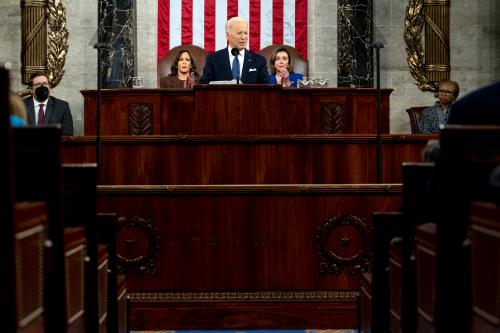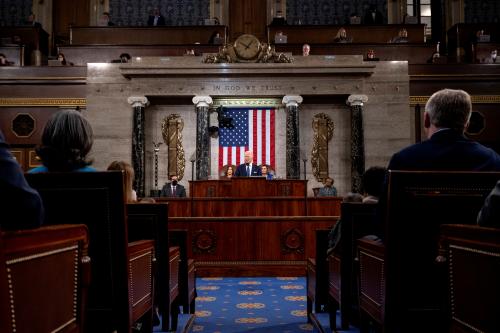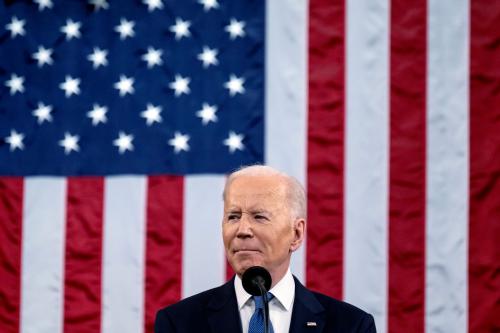In a fighting State of the Union address, President Biden made few concessions to public skepticism about his record—and none to his political adversaries. He made it clear that he intends to run on his record and that the American people will respond favorably to it as they experience its benefits more fully. He focused on the economy and downplayed the cultural issues that have become more central to our politics over the past decade.
As President Biden stepped to the rostrum to deliver his address, he faced three key tasks: laying out a credible policy agenda for the 118th Congress, integrating this agenda with his political strategy for winning reelection in 2024, and dispelling widespread public doubts about the impact of increasing age on his fitness for a second term.
The president also faced several important obstacles. First, as my colleague Elaine Kamarck has written, there is a tension between the story of accomplishment he wanted to tell and the public’s perception of how things are going. As Kamarck noted, a recent NBC poll found that 71% of Americans think the country is on the wrong track—a continuation of what the pollsters called an unprecedented level of “sustained pessimism.”
A few days after her article appeared, a new ABC/Washington poll underscored Mr. Biden’s challenge. The poll found that 62% of Americans think that the president has accomplished “not very much” or “little or nothing” during the first two years of his presidency, compared to just 36% who say he has accomplished “a great deal” or a “good amount.” In a troubling sign, only 32% of Independents gave him credit for significant achievements. Mr. Biden needed to talk about the many significant bills he had moved through Congress—without describing their effects so expansively as to undermine his credibility.
Mr. Biden also faced tension between ambitious new domestic policy proposals and rising public concerns about the budget deficit. In the two years since he took the oath of office, according to a Pew Research Center survey released the day before his address, the share of Americans saying that deficit reduction should be a top priority surged by 15 points, from 42% to 57%. This increase was bipartisan—17 points among Republicans, but also 15 points among Democrats. The president had to choose between pleasing key constituencies pressing for expensive items such as a permanent child credit and responding to broad-based worries about the country’s fiscal course. Everyone expected him to reject Republicans’ efforts to tie an increase in the debt ceiling to big cuts in government spending. But would he open the door to negotiations in what he regards as the correct framework—crafting a budget for fiscal year 2024 and beyond?
Mr. Biden had to decide, moreover, how to deal with issues—such as crime and immigration—on which the public has given him especially low marks. The Economist/YouGov survey released at the end of January found that only 33% of the electorate approved of his handling of immigration and even fewer—30%—of his handling of crime. (His showing among Independents was especially dismal—just 23% and 19%, respectively.)
Finally, the president needed to make important decisions about his tone. Bill Clinton and Barack Obama—the two most recent Democratic presidents who faced new House Republican majorities after just two years in office—opened their addresses with warm words for the new Republican Speaker. Would Mr. Biden do the same? Would he emphasize that most of his legislative successes had been bipartisan and urge the continuation of this cooperation in the new congress? Would he use the phrase “extreme MAGA Republicans,” which many Republicans (reportedly including House Speaker Kevin McCarthy) regard as an obstacle to cooperation? How would Mr. Biden deal with the adjective problem: The state of the union is [fill in the blank]? If he declared it to be “strong,” as many of his predecessors had, would most Americans feel that he was out of touch? Would he use more tempered words, or avoid the phrase completely?
As President Biden began speaking, many of these questions were quickly answered. In addition to Democratic leaders past and present, he congratulated the new speaker and—for good measure—his long-term colleague, Senate Minority Leader Mitch McConnell. He underscored the bipartisan accomplishments of the 117th Congress and expressed confidence that the two parties could work together in the 118th. “The people sent us a clear message,” he declared. “Fighting for the sake of fighting, power for the sake of power, conflict for the sake of conflict, gets us nowhere.” Consistent with this theme, he refrained from all references to Republicans as MAGA or extreme. He delivered his speech forcefully if not flawlessly, adding no new fuel to questions about his fitness to serve a second term.
The president made no concessions to public skepticism about his accomplishments. He told the story of what he had done so far, bolstering his case with positive statistics about jobs and the economy. He talked of “progress and resilience,” doing his best to rebut the pervasive belief that the country was on the wrong track.
Mr. Biden spoke, as he often has, about building the economy from the bottom up and the middle out. He characterized his strategy as a “blue-collar blueprint to rebuild America.” As he laid out his plan, his tone turned populist and nationalist. “We should buy America to build America. We’ve been importing foreign goods and exporting American jobs,” he said, trends his proposals will reverse.
Continuing the populist tone, he repeatedly criticized large corporations. He pledged to toughen antitrust enforcement and crack down on abuses of consumers by banks, airlines, and drug companies, among others. To encourage corporations to invest more in their workers, he proposed quadrupling the current 1% tax on stock buybacks.
These and other features of the president’s speech signaled an important part of his reelection strategy—increasing Democrats’ share of the working-class vote, which fell to historically low levels during the 2016 and 2020 elections. He clearly believes that his party’s weakness among these voters reflects economic rather than cultural issues. Many analysts disagree with him, and we won’t know who’s right until November of 2024.
President Biden did not abandon his ambitious domestic agenda. He put back on the table items that a Democratic House and Senate did not enact during his first two years, including paid family and medical leave, affordable childcare, pre-K for 3- and 4-year-olds, and the reinstatement of the Child Tax Credit. He pledged to pay for these and the many other programs by increasing taxes on corporations and wealthy individuals who use special-interest provisions of the tax code to avoid paying what the president called “their fair share.” And he proposed a new tax on stock buybacks—a practice that many see as profiting shareholders at the expense of workers. “The math adds up,” he insisted. “We can reduce the deficit by $2 trillion without touching Social Security and Medicare.”
In one of his best moments of the night, Biden went on the attack, accusing “some” Republicans of wanting to cut Social Security and Medicare. (He was referring to Senator Rick Scott’s plan to sunset all federal programs.) This drew strong objections from Republicans in the audience who heckled him about this, knowing that being associated with Scott’s proposal meant touching the third rail of American politics. Rather than ignoring this interruption, Biden engaged with the objectors and, in a masterful moment of political jujitsu, concluded that they agreed with him not to touch those programs. Time will tell, but he may have won the debt ceiling debate then and there.
The president touched on the issues—crime and immigration—about which the people have given him his lowest marks, but he had nothing new to offer. And to the surprise of some, and the relief of many, he was silent on the issues—including critical race theory and the role of parents—that have roiled public education in recent years.
During the conclusion of his speech, President Biden firmly resolved what I called the adjective problem. “Because the soul of this nation is strong, because the backbone of this nation is strong, because the people of this nation are strong, the State of the Union is strong,” he declared. He left no doubt about the depth of his conviction. The question is whether he persuaded enough of his fellow citizens that he is right.







Commentary
Biden makes his case to Americans in the State of the Union
February 8, 2023